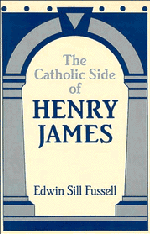Book contents
- Frontmatter
- Contents
- Preface
- Calendar: Chief Items of Catholic Interest in Henry James
- Documentation
- Dedication
- Part One Bibliographical Leads, Historical Considerations
- Part Two Representing Catholicity
- Part Three The Narratives of Catholic Conversion
- Part Four Pas de quatre
- Part Five The Catholic Ménage as Literary Space
- Part Six “Prove That I'm Not!” – Toward the Impossibility of Interpretation
- Notes
- Index
- Cambridge Studies in American Literature and Culture
Part Two - Representing Catholicity
Published online by Cambridge University Press: 19 March 2010
- Frontmatter
- Contents
- Preface
- Calendar: Chief Items of Catholic Interest in Henry James
- Documentation
- Dedication
- Part One Bibliographical Leads, Historical Considerations
- Part Two Representing Catholicity
- Part Three The Narratives of Catholic Conversion
- Part Four Pas de quatre
- Part Five The Catholic Ménage as Literary Space
- Part Six “Prove That I'm Not!” – Toward the Impossibility of Interpretation
- Notes
- Index
- Cambridge Studies in American Literature and Culture
Summary
The Protestant Base
The religious base from which Henry James set out to be a writer was unquestionably a liberalized nondenonimational American Protestantism rather than that happy-go-lucky irreligious indifference so blithely imputed to him in virtually all Henry James criticism. That he was uninterested in religious matters, for what they might yield him as a writer of fiction, if for nothing more, is copiously refuted by the textual evidence of his tales and novels, and at least one play, as well as by an early (31 March 1873) letter from Rome to Charles Eliot Norton in which, among other things, he says: “[T]he religious passion has always struck me as the strongest of man's heart…. I don't know how common the feeling is, but I am conscious of making a great allowance to the questions agitated by religion, in feeling that conclusions and decisions about them are tolerably idle.” The perfectly balanced paradox of religious centrality and vague liberalistic tolerance is pure James. In the same paragraph, he admits that “civilization, good and bad alike, seems to be leaving it” – “Christianity in its old applications” – “pretty well out of account.” And yet, even “when one thinks of the scanty fare, judged by our usual standards, in which it has always fed,” we must all the more recognize and remark on “the powerful current continually setting towards all religious hypotheses,” with the result that “it is hard not to believe that some application of the supernatural idea, should not be an essential part of our life."
- Type
- Chapter
- Information
- The Catholic Side of Henry James , pp. 16 - 56Publisher: Cambridge University PressPrint publication year: 1993



